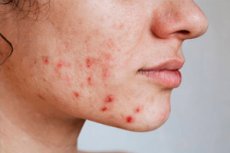Nye publikasjoner
Kan en keto-diett med lavt kaloriinnhold bidra til å lindre kviser?
Sist anmeldt: 02.07.2025

Alt iLive-innhold blir gjennomgått med medisin eller faktisk kontrollert for å sikre så mye faktuell nøyaktighet som mulig.
Vi har strenge retningslinjer for innkjøp og kun kobling til anerkjente medieområder, akademiske forskningsinstitusjoner og, når det er mulig, medisinsk peer-evaluerte studier. Merk at tallene i parenteser ([1], [2], etc.) er klikkbare koblinger til disse studiene.
Hvis du føler at noe av innholdet vårt er unøyaktig, utdatert eller ellers tvilsomt, velg det og trykk Ctrl + Enter.

I en liten pilotstudie opplevde noen unge kvinner som prøvde å gå ned i vekt på en kalorifattig keto-diett en uventet bonus: Aknene deres begynte å forsvinne.
«Disse resultatene representerer en mulighet til å kontrollere en hudsykdom som rammer de fleste ungdommer og mange voksne på et tidspunkt i livet, og som forårsaker stress, forlegenhet, angst og lav selvtillit, og frarøver dem livskvaliteten», sa hovedforfatter av studien, Luigi Barrea, ved Telematica Pegaso-universitetet i Napoli, Italia.
Teamet hans presenterte funnene sine på den europeiske kongressen om fedme i Wien, Italia.
Som Barreas team forklarte, regnes akne som en kronisk inflammatorisk sykdom som påvirker den såkalte pilosebaceøse enheten: hårsekken, hårskaftet og den tilstøtende talgkjertelen. Omtrent 9 % av verdens befolkning lider av akne, hovedsakelig i ungdomsårene.
Akne har lenge vært knyttet til fedme, muligens fordi begge tilstandene er assosiert med økt betennelse og oksidativt stress, ifølge italienske forskere.
Kan keto-dietten bekjempe denne betennelsen og oksidativt stress?
«Selv om kostholdets rolle i behandling av akne er kontroversiell, er lavkalori-keto-dietten kjent for å hjelpe til med vekttap og skape betennelsesdempende ketonlegemer, som gir energi når det er lite karbohydrater i kosten og bidrar til å bekjempe betennelse og oksidativt stress», forklarte Barrea i en pressemelding. «Vi bestemte oss for å utforske denne potensielle aknebehandlingen.»
Studien deres var liten: bare 31 unge kvinner (i alderen 18–30) som var overvektige og hadde moderate nivåer av akne.
Alle kvinnene startet en 45-dagers lavkalori-keto-diett (kun 700–800 kalorier per dag). I følge keto-regimet kom 44 % av kaloriene fra fett, 43 % fra protein og bare 13 % fra karbohydrater.
Alle kvinnene fullførte dietten med hell, og rapporterte noen milde «bivirkninger» som hodepine og muskelsvakhet.
Resultatene av vekttapet var imponerende. I løpet av 45 dager mistet kvinnene i gjennomsnitt omtrent 8 prosent av kroppsvekten sin, med en tilsvarende prosentvis reduksjon i midjeomkretsen, rapporterte Barreas team.
Akne ble også bedre: på den vanlige Global Acne Rating Scale ble gjennomsnittspoengsummen forbedret med 41,5 % i løpet av diettperioden på 45 dager.
I tillegg rapporterte forskerne at «deltakerne rapporterte betydelige forbedringer i livskvaliteten, med en gjennomsnittlig forbedring på 45 %».
Barreas team sa at det var et vitenskapelig grunnlag for forbedringen av akne. De fant at markører for systemisk betennelse, oksidativt stress og helsen til tarmmikrobiomet alle ble bedre. Forbedringer i betennelse og oksidativt stress så ut til å korrelere med redusert alvorlighetsgrad av akne, sa teamet.
«I denne lille pilotstudien viste en 45-dagers keto-diett med lavt kaloriinnhold betydelige forbedringer i alvorlighetsgraden av akne, noe som så ut til å være relatert til diettens kjente antioksidant- og antiinflammatoriske effekter», konkluderte Barrea.
Han understreket imidlertid at studien var svært liten, og fordi resultatene ble presentert på en medisinsk konferanse, bør de anses som foreløpige inntil de publiseres i et fagfellevurdert tidsskrift.
Men «hvis det bekreftes i større, mer robuste studier, kan keto-dietten med lavt kaloriinnhold være et verdifullt alternativ til antibiotika og topiske behandlinger for å hjelpe de mange tusen menneskene som lider av akne», sa Barrea.
